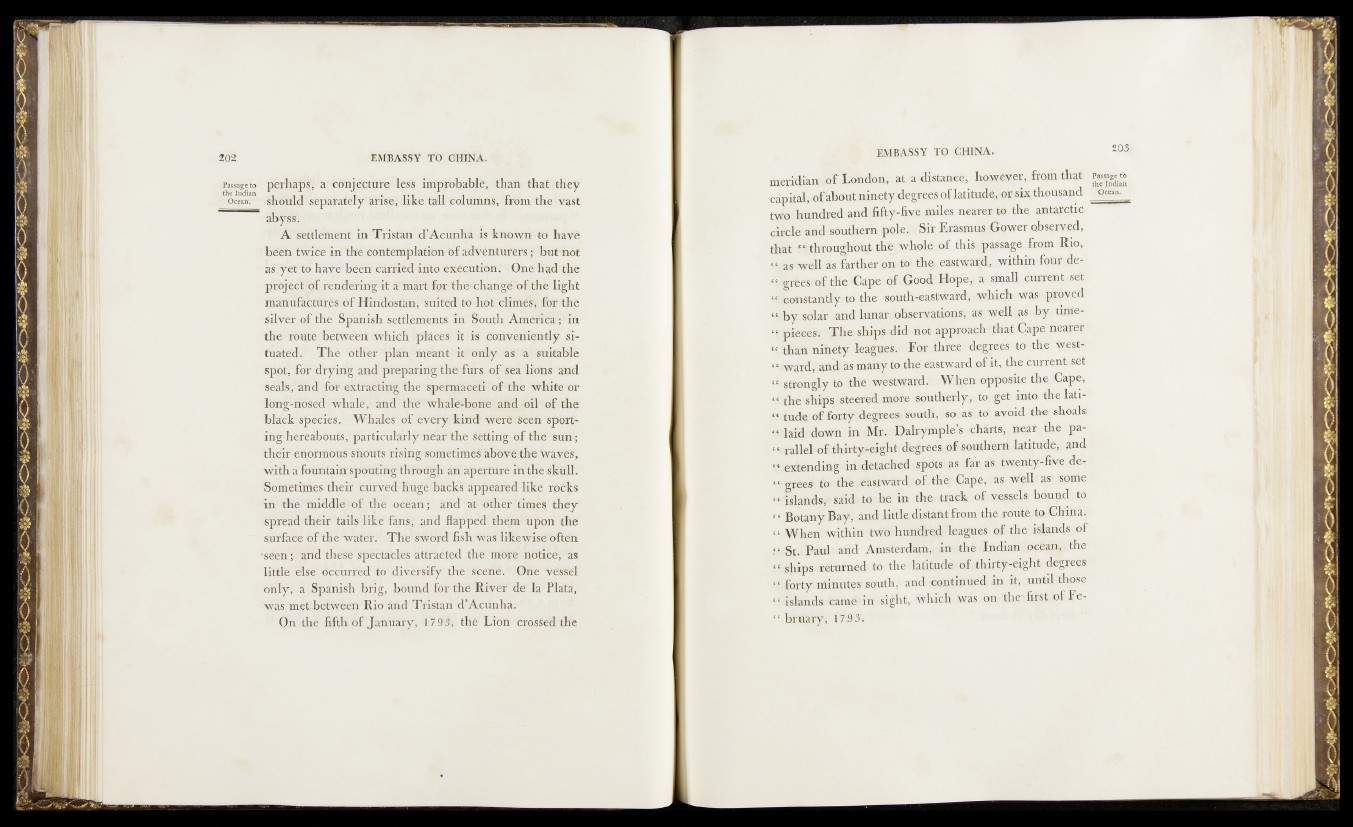
202 EMBASSY TO CH IN A .
Passage to perhaps, a conjecture less improbable, than that they
tlft/n dU f , . i -1 II , r i • oceairr should separately arise, like tall columns, Irom the vast
abyss. I! I
A Settlement in Tristan d’Acunha is known to have
'■* b'eéh twicé in- thfê Contemplation óf adventurers'; briPhó't
as y e t to hâve been carrïédintöéxécutiöri.; ;(^
project of renderinjP-it a mart fort-né’&hang'éfof the light
manufactures-'of Hindostah, suited to hot- climëfet for thè
silver, of the Spanish settlements in South America-? in
which ’plâèëSuit is conveniently situated.
Thè othfer plkh meant it;-only aS'-a- Suitable
spot,'for drying and preparing’the lurs of sea lions and
seals, and for extracting'the spermaceti! of the White or
longufosed - Whale, and thfé’whalèdfóbè^^ of the
black spefc’ies. Whales bf -èvëfy;kind’ wWe^sl'eA Sporting
heréabouts, particularly near the setting of the sun ;
their enormous snouts’ rising Sometimefabove^the w&Yéï,
With a fountain spouting through an aperture in the skull.
Sometimes their eürvëd Hugê^BâékS âppëarèd file rock’s
in the middlë- of the océàri f and at other times thèy
spïekd their tails like fans,’ and flapped thetfi' upon the
— shrfâée of théfWâtferi * iThë^swbrd fish Was likewise-Often
'seen ; and th^l^spëcïacles atttùéted thë: more iiëtiée? as
little else occurred toïd|vèr|flFy the scene. One Vessel
only, a Spanish bng, bound for thë River de la Plata,
was met beéwéen Rio and Tristan d’Acunha.
On the fifth of January , 17 &$, the Lion crossed thé
meridian<Jof «London, at a*<fetanc$ I P g É | g
capital, dfiabontàÿinety dk£#ees ©fJatitude^ or six,thousand °cean-
twta-drandred and fi&y-fiveinileS -nearerAo the anta$g|ic< *
ojjjcle arid southern p’ofob’ Sir Erasmns^ower ofoyrygd?
that “ throughout tte t whole .of thi^passage from Rio,
‘-has; well ais(farther on to eastward,- ypthin/fom-de--
‘%éesiof the Cape-joSQood! Hope*- a - small owrept.sefe
^constantly-to th e 'soüthveastward, which-wa^prôyed
' ‘ by solar and lunar-iöBseryiatipnsl', ay welLsVby, time-
“ pieces.' The ships-'did-not approach f-thafcfiipe npafer>
“ than ninety leagues; For th i e e ^ ^ « t « ,t h f e Wi^sK'
<-‘iward;> and as many to thé easfcWnrdi® fch,. the ^p ÿ^ 4ïséèf
“ strongly-to Ihö . we&w-ard: ^Wben -opposite tfctt&pe,
“yhe ships ®teered> more southerly,; to -get; feto tfel^ti-
“ etude of forty- degree;* south,* iso-. iasIrfoUavoid the shoals
“ laid down in Mr. Dalrymple’s charts, near the pa*
“ rallel of thirty-eightfUegrees^of southern lati|udl$and
extending.' imdetached .spots*as far, as .iwenty-fiy^de^f
“ grees to the -eastward' of theCape,, as w-ellf a,« ; some
lilani^said)to be in the track,; oft ves^ls bpundj_>to
“ Botany Bay, and little distant fe?m.6hfiiipute.tip Chipai
o When' within two hundred leagues of the- islands,, of
.“ St;. Paul and Amsterdam, in thêjlndian.'.peéan^ïthe
“ ships returned to the latitude, of) thirty-eight- d ig u e s1
‘t forty minpl#<south,;’ a n i“qop|ifeHediiri it, untilithpse-
“ islands camé in sight, which was [bn the;first off®^
“ brüary, 17$ 3.